Idunn (Old Norse Iðunn) was the Aesir goddess of youth and rejuvination. She was the guardian of the golden apples which was the source of the gods immortality. Her ancestry is unknown, however there are hints that she might have been an elf or dis. We do know she was the wife of Bragi, the god of wisdom and poetry.
Idunn is also at the center of a great story of betrayal and revenge. The eternal mischivous Loki aids a jötun in kidnapping her, only to rescue her later. I will dive into that story below, but I’ll admit it was a favorite already when I was a small boy.
Idunn Key Facts
| Parents | Unknown |
| Partners | Bragi |
| Siblings | None mentioned |
| Offspring | None |
| Tribe | Aesir |
| Old Norse name | Iðunn |
| Other names | Idun, Iduna |
| The God of | Youth and Rejuvenation |
| Ass. Animal | Apples (symbol of her power) |
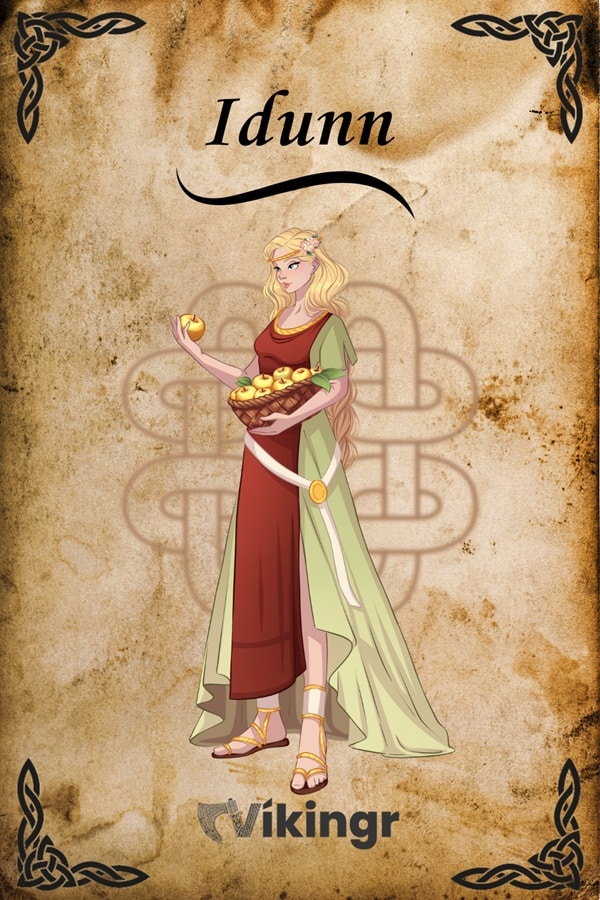
Name and Etymology
The name Idunn (Old Norse Iðunn) has several variants, including “Idun,” “Idunna,” and “Ithun.” Different scholars have delved into its etymology, suggesting that her name might carry meanings such as “ever young,” “rejuvenator,” or “the rejuvenating one.” However, there isn’t a clear translation of the meaning of her name, just part of her mystery I guess. These interpretations resonate deeply with her role in Norse mythology. Even today, the name Idun is a popular female name in case you are expecting a daughter.
Ancient Norse Interpretation
Delving deeper into the Old Norse roots of “Iðunn,” we find intriguing components that shed light on its etymology. The prefix “Ið-” is tied to the Old Norse term “ið,” denoting “deed” or “action,” suggesting activity or a designated task. On the other hand, the suffix “-unn” is prevalent in Old Norse feminine naming conventions. While its precise meaning remains a bit of a mystery, it’s believed to evoke feelings of love or affection. When combined, “Iðunn” can be poetically interpreted as “one who performs deeds of love/affection” or “active in love,” aligning seamlessly with her essence as the rejuvenator and sustainer of youth and vitality among the gods.
Kennings
Kennings are poetic metaphors used in Norse literature to provide alternative, often more descriptive, names for entities or objects. They add depth and richness to the narrative, allowing for multiple layers of interpretation.
In the Skáldskaparmál, a section of the Prose Edda, Idunn is described through various kennings:
- Wife of Bragi: This kenning emphasizes her relationship with Bragi, the god of poetry.
- Keeper of the Apples: Highlighting her role as the guardian of the apples that grant youth.
- Age-Elixir of the Aesir: This kenning for the apples underscores their importance as the source of the gods’ immortality, and how she is almost synonymous with the apples themselves.
- Spoil of the Giant Thjazi: Referring to the tale where Thjazi, the giant, abducted her, emphasizing the lengths beings would go to obtain the rejuvenating apples she guarded.
These kennings not only provide alternative names for Idunn but also offer insights into her significance in the Norse pantheon and the various tales associated with her.
Origins and Family
Idunn’s parentage remains a mystery, as ancient texts do not provide explicit details about her lineage. Unlike many other gods and goddesses in Norse mythology, her family ties are not extensively explored. However, her significance is not diminished by this lack of familial context.
Idunn’s most notable relationship is with Bragi, the god of poetry. Their union symbolizes the harmonious blend of youth and artistry.
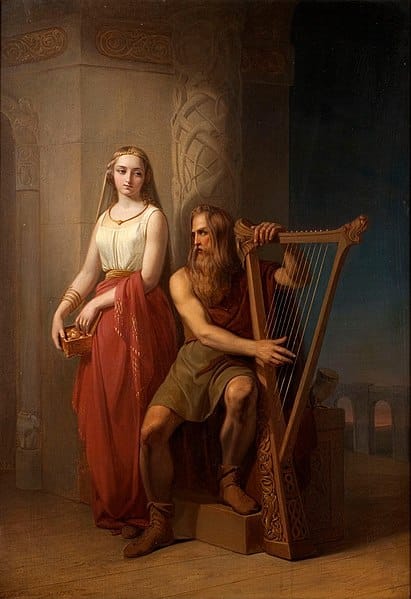
Bragi
Idunn and Bragi share a bond that transcends mere companionship. Bragi, with his eloquence and poetic prowess, complements Idunn’s essence of youth and vitality. Their relationship is a testament to the Norse belief in the interconnectedness of life’s various facets. Together, they embody the balance of ageless beauty and artistic expression.
Idunn’s Roles And Responsibilities
Idunn’s primary role in the Norse pantheon is undeniably pivotal, serving as the guardian of the magical apples, often referred to by the poetic kenning “Keeper of the Apples.” These aren’t mere fruits; they are the very essence of youth and vitality for the Aesir. The Skáldskaparmál, a section of the Prose Edda, provides a poetic descriptor for these apples, calling them the “Age-Elixir of the Aesir.” This name underscores their profound significance, as they are not just symbols of youth but the very elixir that grants the gods their agelessness.
The location of these apples, while not explicitly detailed in every saga, is believed to be in a special grove in Asgard, where Idunn diligently guards them. Her responsibility is not just to protect these apples but also to ensure their distribution among the gods, maintaining their youthful vigor.
The sheer importance of Idunn’s role becomes starkly evident in the tale of her abduction by the giant Thjazi. The Skáldskaparmál recounts the dire consequences of her absence: “The Aesir became severely impacted by the disappearance of Idunn, and speedily they became hoary and old.” This rapid aging of the gods in her absence highlights the indispensable nature of her role. Without Idunn and her rejuvenating apples, the very essence of the gods, their strength, and vitality, is at risk.
In essence, Idunn’s responsibility goes beyond mere guardianship. She is the linchpin holding the balance of life and agelessness for the gods, making her one of the most vital figures in Norse cosmology.

Depiction And Characteristics
Idunn is often depicted as a radiant young woman, holding a basket of golden apples. These apples, the source of her power, are a recurring motif in her representations.
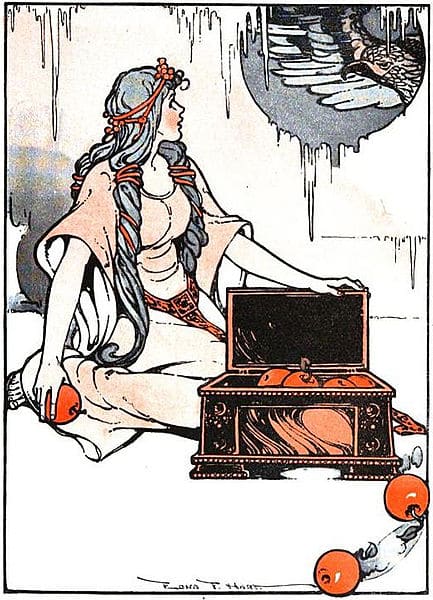
Her personality, as gleaned from the myths, is one of gentleness and benevolence. Unlike the more combative deities of Norse mythology, Idunn’s strength lies in her ability to heal and renew.
While not as prominently featured in battles or epic quests, Idunn’s quiet resilience is evident in her encounters with giants and her unwavering commitment to her role.
Idunn’s Symbols
The most potent symbol associated with Idunn is the golden fruit, commonly referred to as “apples.” These fruits, written in Old Norse as “Epli,” are the very embodiment of her power and the source of the gods’ eternal youth.
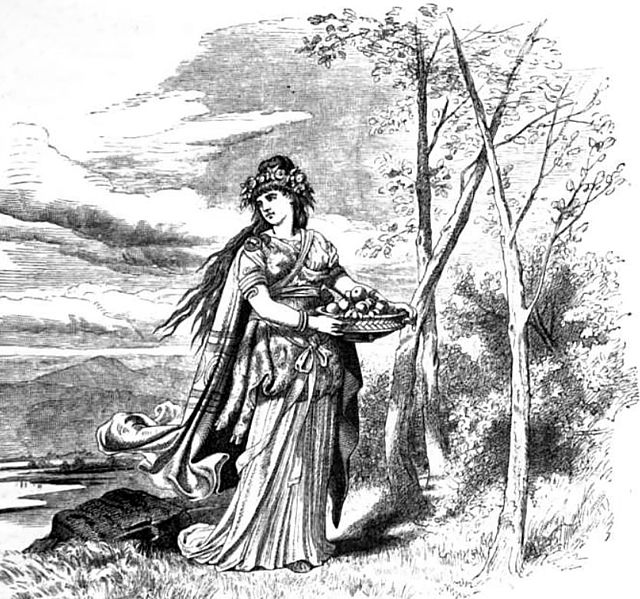
However, the translation of “Epli” as “apples” has been a subject of debate among scholars. While “Epli” is typically translated as “apples,” it could also denote a more general fruit. I want to add that in Norwegian, apples today are “eple”, so it seems pretty consistent.
Some scholars have even posited that the concept of apples as we know them might not have been familiar to the Vikings, suggesting that the term could have referred to another type of fruit. This theory is challenged by the fact that wild apples were indeed accessible in Scandinavia during the Viking Age. They have even been documented as part of their diet.
The association of Idunn’s fruit with apples might also have been influenced by external mythologies. The story of the Golden Apples in the Garden of Hesperides from Greek mythology could have traveled to Scandinavia. That could indeed have inspired the Norse variant of the life-giving golden apples. The parallels between the two myths — both featuring golden fruits that confer immortality or eternal youth — are hard to ignore.
Play Fun Norse Quiz
Is this article making you even more curious about Norse gods and goddesses? You can satisfy your curiosity by playing a fun Norse mythology quiz. This way, you can test your knowledge about Norse gods and goddesses, as well as fill in some gaps. Good luck and have fun playing!
Don’t forget to try our other games as well!
Myths about Idunn
Idunn’s tales, rich with intrigue and lessons, center around the golden apples, her abduction, and the subsequent events that ripple through the realms of gods and giants.
The Golden Apples of Youth
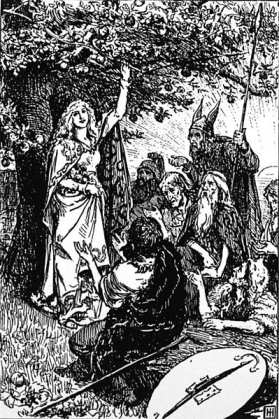
The golden apples, under Idunn’s guardianship, are more than just fruit. They embody the very essence of youth and vitality for the Aesir. Whenever the gods feel the weight of age, they turn to these magical apples for rejuvenation. Their significance is paramount; without them, the gods would age and wither.
Thjazi’s Deception and Loki’s Trickery
Thjazi, a cunning giant, coveted the golden apples. In a scheme to obtain them, he captured Loki. Under duress, Loki struck a deal with Thjazi: his freedom in exchange for leading Idunn out of Asgard’s protective walls. Once she was outside the safety of Asgard, Thjazi abducted her, taking her to his icy fortress.
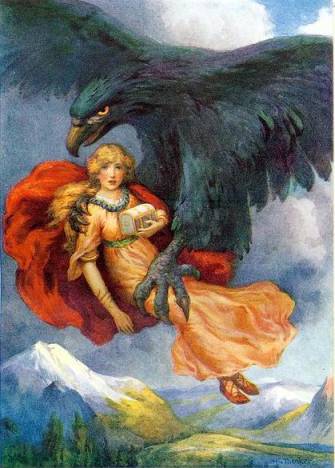
The absence of Idunn and her apples had immediate and dire consequences. The gods began to age rapidly. Realizing Loki’s role in the deception, they cornered him, threatening him with severe punishment, even death. Fearing for his life, Loki vowed to rescue Idunn and return the precious apples.
Loki’s Redemption and Thjazi’s End
Desperate to right his wrong, Loki borrowed Freyja’s falcon cloak, transforming into a bird. He flew to Thjazi’s realm, outsmarting the giant and rescuing Idunn. As they fled, Thjazi, in the form of an eagle, gave chase. Nearing Asgard, the gods set a trap, lighting a fire at its boundaries. Thjazi, unable to stop in time, was ensnared by the flames, meeting his end.
Skadi’s Demand and Marriage to Njord
Thjazi’s death was not the end of the tale. His daughter, Skadi, driven by grief and anger, stormed Asgard, seeking justice for her father’s death. To appease her and restore peace, the gods offered her a unique choice: a husband from among them, chosen only by their feet. Skadi, hoping to select the handsome Balder, mistakenly chose Njord. Their union, born from conflict, symbolizes the intricate balance of emotions and diplomacy in Norse tales.
Mentions in Ancient Texts
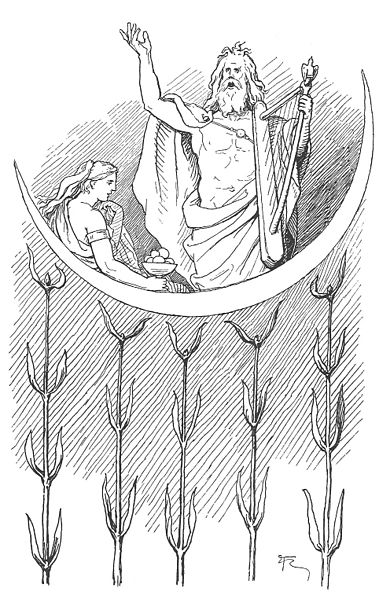
The intricate tales and mentions of Iðunn span various ancient texts, offering glimpses into her role and significance in Norse mythology. As we delve into these mentions, it’s essential to approach them with a discerning eye, understanding the context and origins of each source. A notable point of discussion among scholars is the dating of the Hrafnagaldr Óðins poem. While some evidence suggests a 16th-century origin, the consensus leans towards the 17th century, especially given Annette Lassen’s insights on its postmedieval composition.
Poetic Edda
Lokasenna
In the Lokasenna, Iðunn is introduced as Bragi’s wife and is present at a feast hosted by Ægir. A significant dialogue unfolds between Loki and Iðunn after Loki insults Bragi. Loki accuses Iðunn of having an affair with her brother’s killer, an allegation that remains uncorroborated in any other source. Their exchange is as follows:
Idunn said: “I ask you, Bragi, to do a service to your blood-kin and all the adoptive relations, that you shouldn’t say words of blame to Loki, in Ægir’s hall.”
Loki responded: “Be silent, Idunn. I declare that of all women, you’re the most man-crazed since you placed your arms, washed bright, about your brother’s slayer.”
Idunn retorted: “I’m not saying words of blame to Loki, in Ægir’s hall. I quietened Bragi, made talkative with beer; and all living things love him.”
Hrafnagaldr Óðins
In the Hrafnagaldr Óðins, Iðunn’s lineage is traced back to the elves. She’s depicted as one of “Ivaldi’s elder children” and as a dís residing in dales:
“In the dales dwells, the prescient Dís, from Yggdrasil’s ash sunk down, of alfen race, Idun by name, the youngest of Ivaldi’s elder children.”
Prose Edda
Skáldskaparmál
The Skáldskaparmál section of the Prose Edda prominently features Iðunn. She’s introduced as Bragi’s wife and is known for safeguarding a wooden box (eski) filled with apples. These apples, when consumed by the gods, rejuvenate them, a phenomenon that persists until Ragnarök. The gods’ dependency on Iðunn’s apples becomes glaringly evident when they face dire consequences due to her absence.
Gylfaginning
In the Gylfaginning section of the Prose Edda, Iðunn is highlighted as Bragi’s wife and the guardian of an eski, a wooden box containing rejuvenating apples. The gods consume these apples to regain their youth, a ritual continuing until Ragnarök. Gangleri (King Gylfi in disguise) notes the gods’ dependence on Iðunn and her apples. In response, High hints at a past event where Iðunn’s role was crucial, before shifting the conversation to discuss other Æsir.
Frequently Asked Questions
The apples are symbols of youth and rejuvenation, essential for the gods to maintain their immortality.
Idunn is married to Bragi, the god of poetry.
The gods aged rapidly in her absence, highlighting her importance in their lives.
No, her strength lies in her ability to heal and renew, rather than combat.
The “Prose Edda” by Snorri Sturluson is the primary source of her tales.
There’s no mention of Idunn having any offspring in the ancient texts.
Gallery
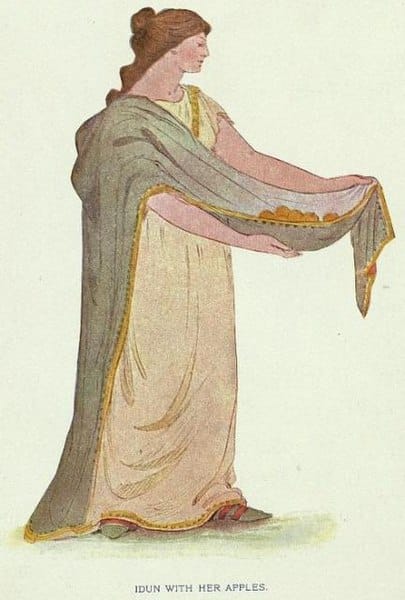 Idun With Her Apples
Idun With Her Apples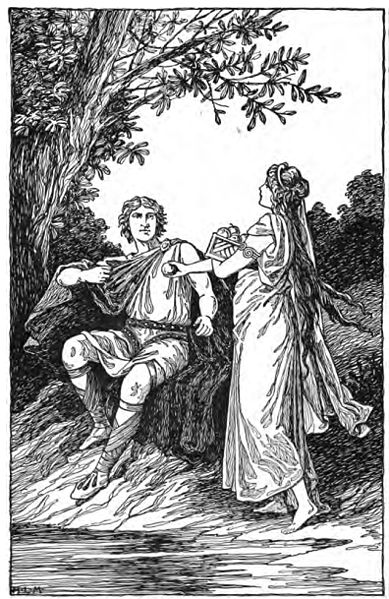 Iduna Giving Loki the Apple
Iduna Giving Loki the Apple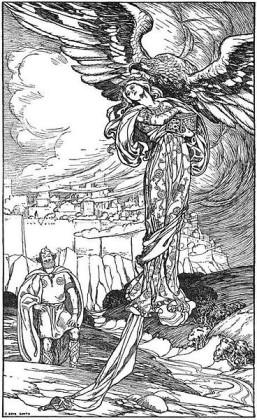 He flapped away with her, magic apples and all” by Elmer Boyd Smith. The jötunn Þjazi, in the form of an eagle, abducts the goddess Iðunn.
He flapped away with her, magic apples and all” by Elmer Boyd Smith. The jötunn Þjazi, in the form of an eagle, abducts the goddess Iðunn.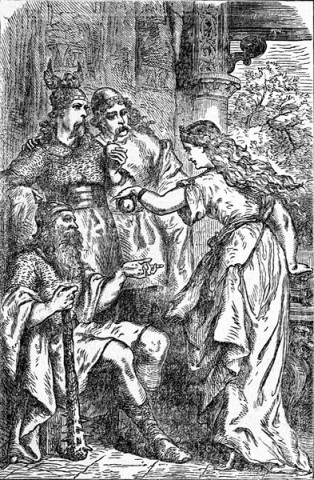 Iduna giving the magic apples
Iduna giving the magic apples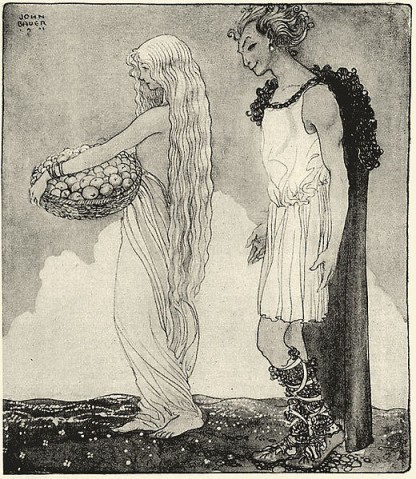 Loki and Idun (1911) by John Bauer
Loki and Idun (1911) by John Bauer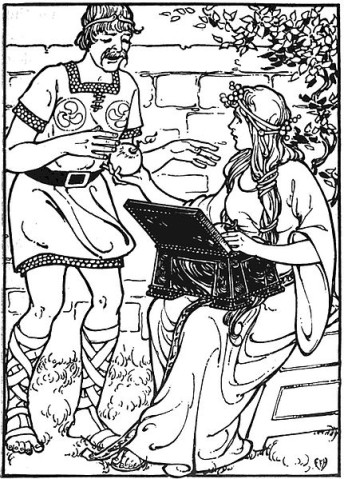 The goddess Iðunn hands Loki an apple from her eski
The goddess Iðunn hands Loki an apple from her eski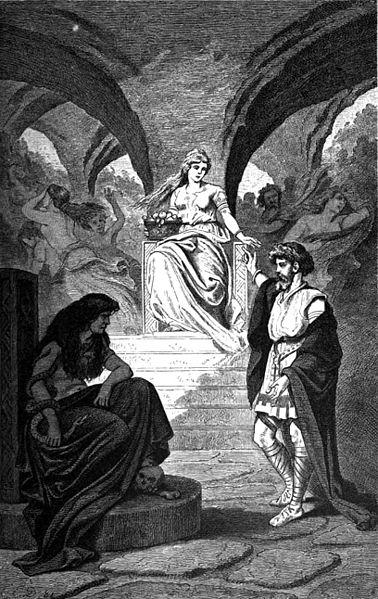 Heimdal demands Idun’s return from the underworld. Heimdallr desires Iðunn’s return from the underworld. Compare with Hrafnagaldr Óðins
Heimdal demands Idun’s return from the underworld. Heimdallr desires Iðunn’s return from the underworld. Compare with Hrafnagaldr Óðins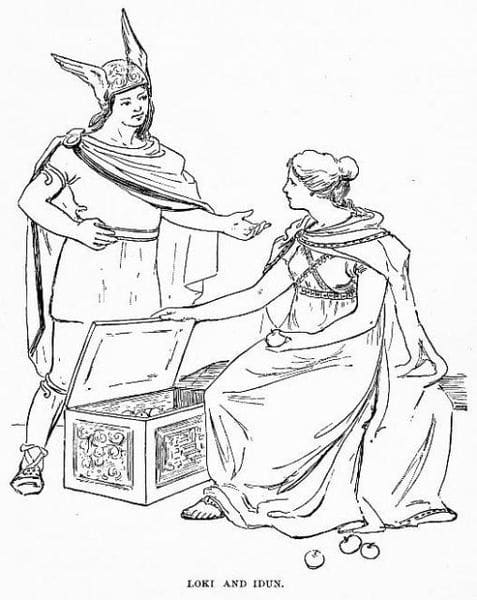 Loki and Idun
Loki and Idun Idun Brought Back to Asgard
Idun Brought Back to Asgard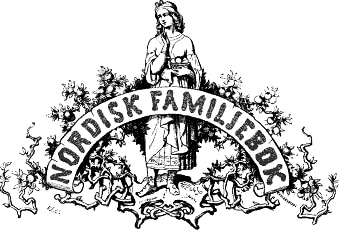 The logo of the first edition (1876) of the Swedish Encyclopedia Nordisk familjebok features a depiction of Iðunn
The logo of the first edition (1876) of the Swedish Encyclopedia Nordisk familjebok features a depiction of Iðunn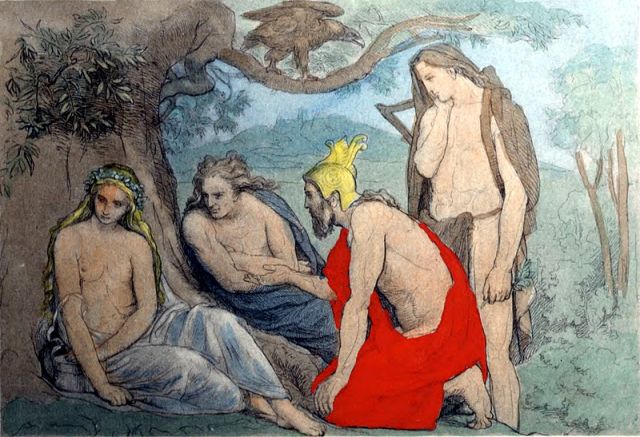 From left to right: Iðunn, Loki, Heimdallr and Bragi. Illustration of a scene from the poem Hrafnagaldr Óðins.
From left to right: Iðunn, Loki, Heimdallr and Bragi. Illustration of a scene from the poem Hrafnagaldr Óðins.
Featured Image Credit: James Doyle Penrose, Public domain, via Wikimedia Commons
